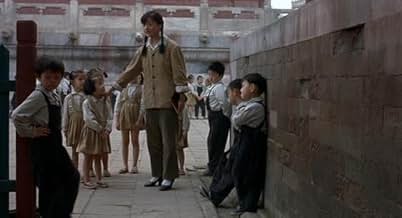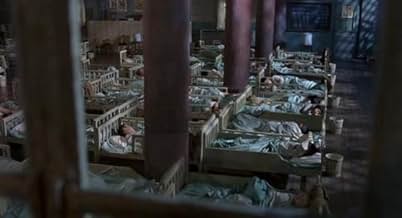NOTE IMDb
6,7/10
1,6 k
MA NOTE
Ajouter une intrigue dans votre langueA young boy starting school for the first time struggles to fit in to a strictly regimented society in in post-revolutionary China.A young boy starting school for the first time struggles to fit in to a strictly regimented society in in post-revolutionary China.A young boy starting school for the first time struggles to fit in to a strictly regimented society in in post-revolutionary China.
- Réalisation
- Scénario
- Casting principal
- Récompenses
- 8 victoires et 3 nominations au total
Avis à la une
Admittedly fairly intriguing story that is blatantly an allegory for something. Presumably oppression in some country. But which one...
My enduring memory of this movie is bodily functions. A lot of lavatorial stuff and some prepubescent nudity. I'm weirded out by the teachers that take even discrete flatulence very personally.
I'm not convinced that this had anything to say beyond that oppression is exists and that its bad but I still respect how this movie waves the flag for vulgarity and raises a juvenile middle finger the authority figures that think they're so different to those they're oppressing.
It's whimsical good fun that's on the right side at least even if it falls short of being the profound statement at least one of the producers must have thought it was.
Good child actors and a sweet sense of color and composition.
My enduring memory of this movie is bodily functions. A lot of lavatorial stuff and some prepubescent nudity. I'm weirded out by the teachers that take even discrete flatulence very personally.
I'm not convinced that this had anything to say beyond that oppression is exists and that its bad but I still respect how this movie waves the flag for vulgarity and raises a juvenile middle finger the authority figures that think they're so different to those they're oppressing.
It's whimsical good fun that's on the right side at least even if it falls short of being the profound statement at least one of the producers must have thought it was.
Good child actors and a sweet sense of color and composition.
The movie begins with a cute four year old boy - Fan Qiang Qiang - being admitted by his father in a boarding kindergarten since both the parents are working at different places and are not in a position to care for him.
The kindergaten is strict in enforcing discipline and expects all students to comply with a set of regulations which extend to an extensive gamut of activities from dressing/undressing by oneself, cleanliness, cordial communciaton to others, respect to elders, maintaining order and even to timely pooping (not to forget the washing of hands thereafter). Every successful compliance by the students is rewarded with the titular little red flower which are diplayed on a scoreboard against their names and any subversion results in forfeit of a flower earned earlier.
Qiang is a free spirit by nature and finds it difficult to comply with the strict routines of the school. He is unable to dress/undress himself and does not play with other children. He is also unable to get over the habit of wetting his bed which results in him being ridiculed as "the king of bedwetting" by other students. Consequently, he is unable to earn any little red flower which is so coveted. When his repeated attempts to conform and fit into his desginated role & behaviour fail, Qiang feels enormous frustration which pushes him down the road of being an aggressive rebel. The rest of the movie narrates how this conflict between a rebellious Qiang and the disciplinarian kindergarten unfolds.
This is a simple movie which, on the face of it, successfully captures the lives of the tiny tots in a rich canvas sparkling with laughter, fun, frolic, tensions, frustrations, helplesness, sadness as experienced by these cute little toddlers. At a deeper and not-so-subtle level, this movie represents a metaphor for the state of Chinese society under the Communist regime. It portrays the simmering conflict in the society between the innate tendency of every citizen to seek to establish their individuality and the efforts of a seemingly kind, yet oppressive state, which tries to micro-monitor as well as manage the affairs of individuals, through a defined regimen, for what it feels is for a loftier goal of collective order and resultant peace. In the process, any expressions of individuality are construed as a subversion of the carefully engineered public order and is brutally subjugated & crushed.
Through the struggles of his charming little protaganist, Qiang, the director, Zhang Yuan, has successfully captured this continuing conflict between conformity and individuality which permeats the Chinese society. He must also be commended for eliciting such authentic and believable performances (if one can call them so, for they appear so natural) from his cute little cast, especially the adorable and expressive Dong Bowen who plays the young Qiang.
The open-ended finale of the movie is apt for it throws several unanswered questions at the protaganist as well as the viewer and initaites a train of thought on the central conflict portrayed in the movie.
Clocking just about ninety minutes, this movie is short, subtle, highly engaging and raises several questions for the viewer on the merits of conformity, group mentality, need for individuality, the conflict between a society steeped on confirmity & group mentality when faced with expressions of individual freedom as well as the effects of such conflicts on individual members of such society.
The kindergaten is strict in enforcing discipline and expects all students to comply with a set of regulations which extend to an extensive gamut of activities from dressing/undressing by oneself, cleanliness, cordial communciaton to others, respect to elders, maintaining order and even to timely pooping (not to forget the washing of hands thereafter). Every successful compliance by the students is rewarded with the titular little red flower which are diplayed on a scoreboard against their names and any subversion results in forfeit of a flower earned earlier.
Qiang is a free spirit by nature and finds it difficult to comply with the strict routines of the school. He is unable to dress/undress himself and does not play with other children. He is also unable to get over the habit of wetting his bed which results in him being ridiculed as "the king of bedwetting" by other students. Consequently, he is unable to earn any little red flower which is so coveted. When his repeated attempts to conform and fit into his desginated role & behaviour fail, Qiang feels enormous frustration which pushes him down the road of being an aggressive rebel. The rest of the movie narrates how this conflict between a rebellious Qiang and the disciplinarian kindergarten unfolds.
This is a simple movie which, on the face of it, successfully captures the lives of the tiny tots in a rich canvas sparkling with laughter, fun, frolic, tensions, frustrations, helplesness, sadness as experienced by these cute little toddlers. At a deeper and not-so-subtle level, this movie represents a metaphor for the state of Chinese society under the Communist regime. It portrays the simmering conflict in the society between the innate tendency of every citizen to seek to establish their individuality and the efforts of a seemingly kind, yet oppressive state, which tries to micro-monitor as well as manage the affairs of individuals, through a defined regimen, for what it feels is for a loftier goal of collective order and resultant peace. In the process, any expressions of individuality are construed as a subversion of the carefully engineered public order and is brutally subjugated & crushed.
Through the struggles of his charming little protaganist, Qiang, the director, Zhang Yuan, has successfully captured this continuing conflict between conformity and individuality which permeats the Chinese society. He must also be commended for eliciting such authentic and believable performances (if one can call them so, for they appear so natural) from his cute little cast, especially the adorable and expressive Dong Bowen who plays the young Qiang.
The open-ended finale of the movie is apt for it throws several unanswered questions at the protaganist as well as the viewer and initaites a train of thought on the central conflict portrayed in the movie.
Clocking just about ninety minutes, this movie is short, subtle, highly engaging and raises several questions for the viewer on the merits of conformity, group mentality, need for individuality, the conflict between a society steeped on confirmity & group mentality when faced with expressions of individual freedom as well as the effects of such conflicts on individual members of such society.
this is a film that you can easily watch with your little kids, because they can relate themselves to this little hero's rebellion against (totalitarian) adults and their unjust world. the protagonist in this case is a stubborn rascal but he has his own logic in behaving as he does, so take him seriously or otherwise... it is a charming little movie about children's life in post-revolutionary china, a small gem. and on general level it also is a perennial study of a child's inability to understand or accept all the strange things adults do or not do to keep their sometimes questionable authority. a nice addition to Asian kid movies which are usually more of a Japanese or a south korean field of quality cinema.
This is the story of a young boy making a little revolt of his own against his teachers. The plot (if you can call it that) unfolds slowly as we get to follow the kids in their day to day life at the school. The interaction between the kids is great and feels very authentic. Another thing worth mentioning is the photo and the way the camera is always placed in the kids point of view, so the audience always see the adults from below. On the minus side is that many scenes are very predictable and the lack of an actual plot makes it a bit too slow at times. But it's never boring and the heart-warming interaction between the kids as they go their own way makes this a film well worth seeing.
I've watched this film a couple of times and when you think about it, it would be very hard to make such a film and I congratulate the film makers for this effort. But to give it 1 star because it contains "gratuitous child nudity"? is sick. I am referring to a review further up here who talks about child nudity and sick people who "enjoy" that sort of thing.. You know, since you're pointing all these things out maybe you are one of those people, in denial.. One of those that also have issues with women breast-feeding in public.. I didn't even notice "child nudity".. What i saw is a film about little human beings in a boarding school. It was filmed through the eyes of a little child where everything is natural, including nakedness and bodily functions. I was like that back in Eastern Europe, slightly older, but in a similar situation and it kind of brings back some funny memories. It is this kind of righteous moralistic polemic that stirs me right up.. It is you who is troubled by this "child nudity" so stop projecting your perversity on others PLEASE! This is a great 'little' film.
Meilleurs choix
Connectez-vous pour évaluer et suivre la liste de favoris afin de recevoir des recommandations personnalisées
- How long is Little Red Flowers?Alimenté par Alexa
Détails
Box-office
- Montant brut mondial
- 303 898 $US
- Durée1 heure 32 minutes
- Couleur
- Mixage
Contribuer à cette page
Suggérer une modification ou ajouter du contenu manquant

Lacune principale
By what name was Les petites fleurs rouges (2006) officially released in India in English?
Répondre



















